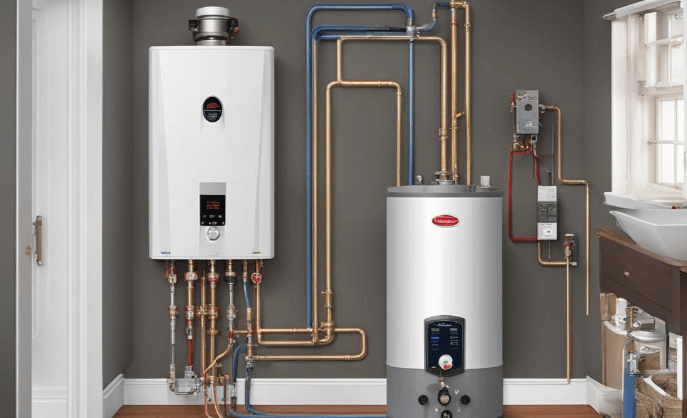Choosing the Right Water Heater: Traditional vs. Tankless Models

Choosing a water heater for your home typically involves deciding between traditional tank water heaters and tankless models. This guide will clarify the key differences and considerations to help you decide between a traditional water heater and a tankless model.
Understanding Traditional Water Heaters
How They Work: Traditional water heaters operate by storing water in a large tank and maintaining it at a pre-set temperature. Water is heated by gas or electricity, and as hot water is used, more cold water enters the tank to be heated.
Pros:
- Lower Initial Cost: Traditional water heaters are generally less expensive to purchase and install than tankless models.
Simplicity: These systems are less complex, which can mean fewer maintenance issues over time.
Cons:
- Higher Operational Costs: Since water is heated continuously or on a cycle, traditional heaters can be less energy-efficient.
- Bulky Size: The tanks take up significant space, which can be a disadvantage in smaller homes.
Exploring Tankless Water Heaters
How They Work: Tankless water heaters, also known as on-demand water heaters, heat water directly without the use of a storage tank. When a hot water tap is on, cold water into the unit where it is heated by a gas burner or electric element.
Pros:
- Energy Efficiency: Tankless models are more energy-efficient because they heat water only when needed, leading to potential savings on energy bills.
- Space Saving: Their compact size allows for installation in tighter spaces, making them ideal for smaller homes.
- Longer Lifespan: Tankless water heaters typically last longer than traditional models, with lifespans that can extend up to 20 years or more.
Cons:
- Higher Initial Cost: The upfront cost for a tankless model, including installation, can be significantly higher.
- Limited Output: In some cases, tankless heaters may struggle to supply sufficient hot water simultaneously for multiple uses, a consideration for larger households.
Read also Essential Accessories for a Solid Roof Setup
Key Factors to Consider
- Household Size and Water Usage: The size of your household and your typical water usage are crucial factors. For larger families with higher water demand, a traditional water heater might be more effective at meeting needs without running out of hot water.
- Budget: If initial cost is a significant concern, traditional water heaters might be more appealing. However, for long-term savings and efficiency, tankless models are worth considering, especially given the rising energy costs.
- Space Availability: In homes where space is at a premium, the smaller size of a tankless water heater can be a decisive advantage.
Making the Right Choice for Your Home
Choosing between a traditional and a tankless hot water heater requires evaluating the pros and cons based on your specific needs and circumstances. Consider the longevity and potential energy savings of tankless models versus the lower initial cost and simplicity of traditional tanks.
Conclusion
In the West Valley, choosing between traditional and tankless water heaters is an important decision that hinges on several factors, such as budget, available space, and water usage needs. Traditional water heaters store a large volume of water in a tank, maintaining it at a set temperature. This can be advantageous for households that require a consistent supply of hot water, like during morning showers or when washing dishes. However, these heaters tend to occupy more space and can lead to higher energy bills due to their constant heating cycle.
Conversely, tankless water heaters heat water on demand, offering greater efficiency and long-term savings. This option is often favored by those seeking energy efficiency and lower utility costs, as they avoid the standby heat losses typical of tank models. For residents with high immediate water demands and budget limitations, traditional units might be preferable due to their capacity to deliver large quantities of hot water quickly, despite their higher energy consumption.





